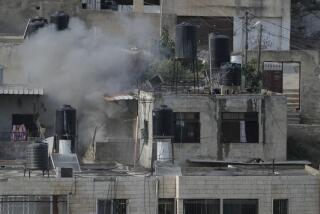Israel Admits Fatal Ambush Was a Mistake
- Share via
JERUSALEM — Five Palestinian policemen killed this week at a checkpoint were deliberately ambushed by Israeli forces who were carrying out a new and more aggressive brand of warfare but executed the wrong prey, Israeli officials acknowledged Wednesday.
The operation, and its results, raised more questions about the military tactics employed by Israel in its so-far unsuccessful attempt to halt a raging Palestinian uprising that has claimed more than 520 lives in 7 1/2 months.
Marking a significant shift in its military strategy, the government of right-wing Prime Minister Ariel Sharon has given Israeli forces a freer hand to initiate offensive strikes--not just defensive or preemptive actions. Opposition politicians have warned that such a policy would lead to dangerous excesses.
Israeli snipers were deployed before dawn Monday to kill members of Force 17, a Defense Ministry official disclosed Wednesday. Israel maintains that the elite unit loyal to Palestinian Authority President Yasser Arafat has participated in numerous attacks on Jews.
But instead of Force 17, the men killed at the checkpoint were from the National Security Forces, whose members Israel had not implicated in attacks. The men were interrupted in their tin guardhouse while preparing a meal and were gunned down one by one, according to the lone survivor and neighbors in the area near the West Bank town of Beitunia.
The Israeli military has ceased making much distinction among the many Palestinian security services, nor between mainstream armed factions and more radical organizations such as Hamas; all of the groups have joined, in one way or another, the fight against Israel. The suggestion is that the list of targets the Israeli army considers legitimate is expanding.
“Right now, everyone is fighting us,” said Yarden Vatikay, a spokesman for the Defense Ministry. “There are no bad guys and good guys among the Palestinian organizations. All are fighting us now, and no one is clean.”
According to both Israelis and Palestinians, the policemen in Beitunia did not open fire before or during the ambush. Israeli officials said the outpost had been used to launch attacks on Jewish motorists and on a nearby army base, a claim Palestinians denied.
Ahmed Najjar, the survivor, gave his account for the first time Wednesday and described in detail the gunfire that felled his comrades. It came from a vacant building about 150 yards away that the Israeli army had taken over a week before.
“The first shots hit Muhammed Khalidi, on guard duty, in the head,” Najjar told reporters in the West Bank city of Ramallah. “Another one also on duty came out to see what was going on and he too received a bullet in the chest and died. A third guard tried to pull him back inside the shack and was shot at the door. A fourth was hit inside.”
Najjar, 23, and the unit commander, Ahmed Zakut, crawled into a ditch behind the guard post, but Zakut was already mortally wounded. Najjar lay still until the shooting stopped.
The slayings enraged Palestinians, who branded them assassinations. A group that claimed responsibility for Tuesday’s killing of a 22-year-old Israeli woman on a West Bank road said it was acting in revenge for the policemen’s slayings.
Elsewhere on Wednesday, Israeli helicopters fired rockets at a Gaza refugee camp and Palestinian police facilities in the West Bank city of Jenin that Israel said were manufacturing mortars. Palestinians reported that at least 10 people were wounded. And a 14-year-old Palestinian boy was killed by Israeli troops in the Gaza Strip.
Lt. Gen. Shaul Mofaz, the Israeli chief of staff, has launched an investigation into the checkpoint incident. A spokesman for Sharon said the shooting was an unfortunate case of mistaken identity, and Foreign Minister Shimon Peres expressed regret for the deaths.
The investigation was launched to determine how the wrong people were killed, Vatikay said.
Israeli newspapers reported Wednesday that Force 17 operatives were not permanently assigned to the checkpoint and would not necessarily be found there on any given day. The Maariv newspaper further reported that Israeli intelligence agents were aware that National Security agents, not Force 17, would be manning the outpost but failed to inform the commanders who authorized the operation.
Lt. Hazem abu Shamla, a National Security Forces commander, said the unit stationed at the Beitunia outpost had been there for three weeks and that Force 17 personnel were not present.
The Israeli troops who killed the Palestinian police did not realize they had gotten the wrong men until they saw the names published the next day, Israeli newspapers said.
Whatever explanations emerge for the killings, the operation itself is part of a broader array of tactics that Israeli forces will employ to wipe out Palestinians’ military capability, Israeli analysts said.
“This [Beitunia] mistake will not hold back the [Israeli army] as it conducts its new offensive, which is rooted in a . . . significantly different approach to the conflict,” Zeev Schiff, military affairs columnist for the Haaretz newspaper, wrote Wednesday. “To the [army], the Beitunia mistake is merely the type of mistake that happens sometimes during a war.”
The offensive, he said, will continue until the Palestinians agree to a cease-fire.
More to Read
Sign up for Essential California
The most important California stories and recommendations in your inbox every morning.
You may occasionally receive promotional content from the Los Angeles Times.














